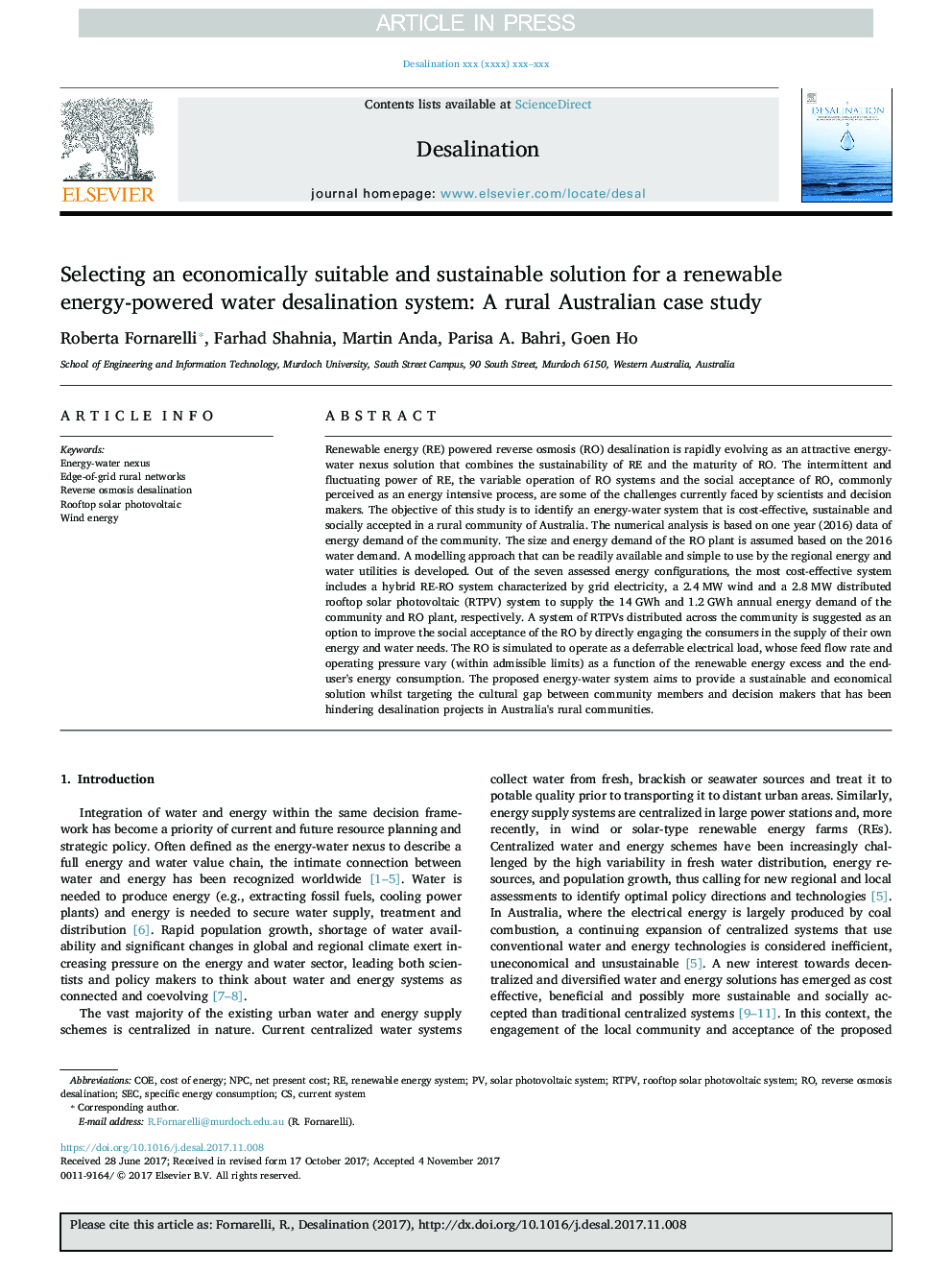| کد مقاله | کد نشریه | سال انتشار | مقاله انگلیسی | نسخه تمام متن |
|---|---|---|---|---|
| 7007920 | 1455260 | 2018 | 12 صفحه PDF | دانلود رایگان |
عنوان انگلیسی مقاله ISI
Selecting an economically suitable and sustainable solution for a renewable energy-powered water desalination system: A rural Australian case study
ترجمه فارسی عنوان
انتخاب یک راه حل اقتصادی مناسب و پایدار برای یک سیستم آب شیرین کننده آب قابل احتراق انرژی: مطالعه موردی روستایی استرالیا
دانلود مقاله + سفارش ترجمه
دانلود مقاله ISI انگلیسی
رایگان برای ایرانیان
کلمات کلیدی
SECNPCEnergy-water nexus - ارتباط انرژی و آبWind energy - انرژی بادRenewable energy system - سیستم انرژی تجدید پذیرSolar photovoltaic system - سیستم فتوولتائیک خورشیدیspecific energy consumption - مصرف انرژی خاصReverse osmosis desalination - نمک زدایی اسمز معکوسCost of energy - هزینه انرژیNet present cost - هزینه خالص فعلیCoe - هم
موضوعات مرتبط
مهندسی و علوم پایه
مهندسی شیمی
تصفیه و جداسازی
چکیده انگلیسی
Renewable energy (RE) powered reverse osmosis (RO) desalination is rapidly evolving as an attractive energy-water nexus solution that combines the sustainability of RE and the maturity of RO. The intermittent and fluctuating power of RE, the variable operation of RO systems and the social acceptance of RO, commonly perceived as an energy intensive process, are some of the challenges currently faced by scientists and decision makers. The objective of this study is to identify an energy-water system that is cost-effective, sustainable and socially accepted in a rural community of Australia. The numerical analysis is based on one year (2016) data of energy demand of the community. The size and energy demand of the RO plant is assumed based on the 2016 water demand. A modelling approach that can be readily available and simple to use by the regional energy and water utilities is developed. Out of the seven assessed energy configurations, the most cost-effective system includes a hybrid RE-RO system characterized by grid electricity, a 2.4Â MW wind and a 2.8Â MW distributed rooftop solar photovoltaic (RTPV) system to supply the 14Â GWh and 1.2Â GWh annual energy demand of the community and RO plant, respectively. A system of RTPVs distributed across the community is suggested as an option to improve the social acceptance of the RO by directly engaging the consumers in the supply of their own energy and water needs. The RO is simulated to operate as a deferrable electrical load, whose feed flow rate and operating pressure vary (within admissible limits) as a function of the renewable energy excess and the end-user's energy consumption. The proposed energy-water system aims to provide a sustainable and economical solution whilst targeting the cultural gap between community members and decision makers that has been hindering desalination projects in Australia's rural communities.
ناشر
Database: Elsevier - ScienceDirect (ساینس دایرکت)
Journal: Desalination - Volume 435, 1 June 2018, Pages 128-139
Journal: Desalination - Volume 435, 1 June 2018, Pages 128-139
نویسندگان
Roberta Fornarelli, Farhad Shahnia, Martin Anda, Parisa A. Bahri, Goen Ho,
